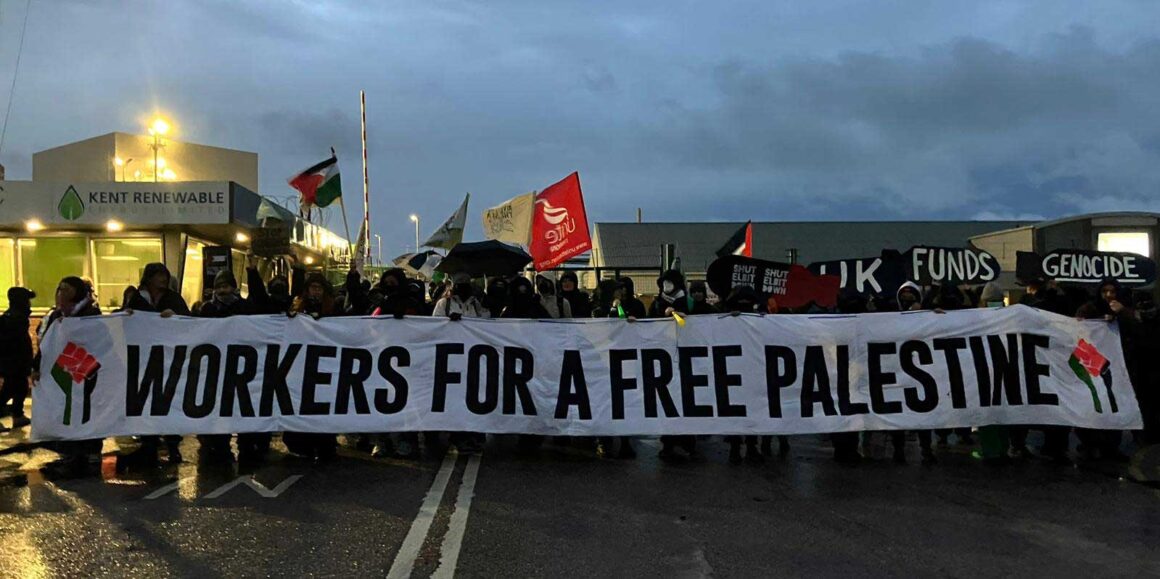

By KD Tait
FOLLOWING ISRAEL’S deadly assault on the Gaza strip, Palestinian trade unions have issued a call for solidarity from the international labour movement.
The statement calls on workers to refuse to build or transport weapons to Israel, to break links with companies complicit in the occupation, and pressure their governments to end military trade and funding to Israel.
Following the incursion by Palestinian resistance forces on 7 October, in which 1,300 civilians were killed and over 200 people taken hostage, Israel has subjected the 2.3 million civilians living in Gaza to a merciless retaliation.
It has demanded 1.1 million civilians leave the northern Gaza strip and enforced this ethnic cleansing through indiscriminate bombardment which has levelled schools, hospitals and entire residential districts. Fuel, food, water and electricity have been cut off for three weeks. More than 6,500 people have been killed, including 2,700 children and over 17,000 injured.
Settlers in occupied Palestine and the West Bank have been armed with 10,000 assault rifles to facilitate their campaign of ethnic cleansing. In the 18 months before the latest war, more than 300 Palestinian civilians had been killed in the West Bank alone.
Israel carries out the colonisation of Palestine and the collective punishment of those who resist under the cover of unconditional military, financial and diplomatic support from the western powers.
The huge demonstrations against Israel’s war demonstrate the gulf that separates the mass of ordinary workers and young people from our rulers’ ‘unconditional support’ for Israel’s crimes.
Faced with the UK’s complicity with Israel’s genocidal assault on Gaza, it is the duty of the British labour movement to act on the appeal for solidarity from our Palestinian sisters and brothers.
This takes on even more importance faced with the Labour party leadership’s attempt to silence internal criticism of its pro-Zionist policy and ban public expressions of solidarity with Palestine.
A workers’ embargo
Last Friday, the RMT union’s National Executive Committee voted to support moves by railway workers to block arms shipments to Israel. All transport workers, including those in the Royal Fleet Auxiliary, should refuse to handle goods or perform duties that could aid the Israeli war effort.
A first step has been taken by young trade unionists who blockaded a subsidiary of Israeli arms company Elbit in Kent on Thursday morning. Elbit has been the target of a long running campaign by direct action group Palestine Action in Leicester, Bristol and elsewhere.
The value of UK military exports to Israel is low compared to other countries. But the UK hosts an arms industry of world importance, providing access to skilled workers, a chain of production, and research, exchange and collaboration with Israel’s two most important security partners, the US and UK. This gives the UK importance to the Israeli war machine well beyond the monetary value of exports.
All Israel-UK trade contributes to supporting or legitimising Israel’s occupation. But Israel is now a developed capitalist country, exporting pharmaceuticals, luxury goods and industrial products. Consumer boycotts are ineffective because they can’t really dent the bosses’ pockets, and, more importantly, they limit solidarity to the sphere of individual acts of conscience, instead of opening the road of struggle for workers’ control in the workplace.
What we need is a campaign of workers’ sanctions to boycott the production, transport and sale of all trade with the Apartheid state. Transport, logistics and distribution workers and their unions have the power to exercise supervision and control over goods bound for and from Israel. No worker should have to take responsibility for propping up an Israeli economy based on the expropriation, exploitation and plunder of the Palestinians.
Just causes defy unjust laws
The anti-union laws make such ‘secondary action’ illegal. They are designed to prevent workers taking effective solidarity action, not just within Britain, but internationally. But mass action can render the laws unenforceable. Trade union leaders should support all unofficial action and call on the TUC to back workers’ sanctions against the apartheid state. At a minimum, Labour affiliated unions should speak out publicly and demand Keir Starmer retract his shameful support for Israel’s genocidal war. If he doesn’t, unions should withhold funds and support.
The fight for effective solidarity with Palestine shows how workers can make the idea that ‘their struggle is our struggle’ reality, not just a slogan. Effective action means defying an unjust law, but it also means breaking with the trade union leaders who, when the time comes for action not words, put legality, and loyalty to capitalism and the British state before international solidarity. To fight for workers’ control over production and transport means fighting for workers’ control over our unions.
In the working class more widely, Palestine action committees can bring together trade union and Labour party branches with solidarity campaigners, anti-racist and anti-zionist groups, students and refugee campaigns to coordinate of workers’ sanctions, protest and direct action to break Britain’s links with the apartheid state.